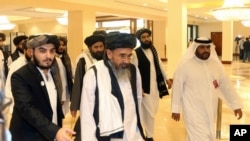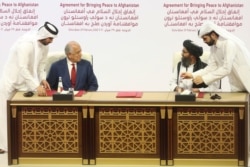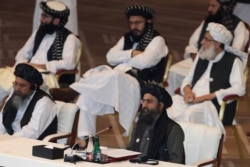The Taliban demanded Sunday that the United States and its foreign military allies leave Afghanistan by May 1, in line with a peace agreement the insurgent group signed with Washington a year ago, warning any attempt to change the path “is already doomed to failure.”
In a statement released to journalists and on its website marking the first anniversary of the February 2020 accord sealed in Doha, Qatar, the Taliban claimed they have fully adhered to, and remain committed to, the understanding aimed at ending two decades of Afghan war. It called on Washington to honor its part of what the group described as a “historic” deal.
U.S. President Joe Biden’s administration is currently reviewing the deal his predecessor, former President Donald Trump, sealed with the Afghan insurgency and deciding whether to pull the remaining 2,500 American soldiers from Afghanistan to close America’s longest war. NATO-led U.S. allies have fewer than 10,000 troops left in the country.
The U.S. review process has stemmed from widespread allegations the Taliban have not lived up to their commitments, including those of cutting ties with al-Qaida and other terrorist groups that threaten the U.S. and the security of its allies.
“The Doha agreement has created a practical framework for bringing peace and security to Afghanistan. If any other pathway is pursued as a replacement, then it is already doomed to failure,” the Taliban statement warned.
It said that Washington has committed itself in the agreement that within 14 months of signing, all U.S.-led international forces and their nondiplomatic personnel, private contractors, advisers, trainers and service providers will withdraw from Afghanistan.
“In line with this agreement, a large part of foreign forces specifically American forces have withdrawn from our country, while the rest must also withdraw within the specified date,” the statement stressed.
The Taliban said Qatar and the United Nations Security Council, along with all other countries and international observers that attended the Doha signing ceremony, “have an obligation in the complete implementation of the agreement that must be fulfilled.”
The insurgents, under the deal, agreed to stop attacking international forces in Afghanistan and to open direct peace talks with representatives of the U.S.-backed Afghan government to try to negotiate a political settlement to the country’s long conflict.
Washington acknowledges the U.S. military has not suffered any casualties since signing the Doha agreement. Before then, the Afghan military mission had claimed the lives of more than 2,400 American soldiers and injured thousands of others.
The Taliban rejected terror link charges and allegations they have intensified the conflict as propaganda by some Afghan and “foreign actors” who the group said are attempting to disrupt the peace process.
Edmund Fitton-Brown, coordinator of the United Nations monitoring team for Islamic State, al-Qaida and the Taliban, told an online event at the Middle East Institute on Thursday that the Taliban have failed to cut ties with al-Qaida.
“As yet, we have not seen any evidence,” he said.
The so-called intra-Afghan negotiations started in September, six months later than scheduled in the U.S.-Taliban deal because of a rift between the Afghan government and the Taliban over the release of 5,000 insurgent prisoners.
Kabul was unhappy with the Doha accord because it was kept out of it.
Meanwhile, the United Nations has reported the Afghan violence has also intensified since the start of the talks, with civilians bearing the brunt of it.
More than 3,000 civilians were killed and 5,800 were injured in Afghanistan in 2020, the U.N office in Kabul said last week. The annual report said civilian casualties rose 45% after the start of the intra-Afghan negotiations.
Afghan leaders allege the Trump administration’s decision to leave Kabul out of the February 2020 agreement has only emboldened the Taliban to intensify military assaults and drag their feet in the peace talks.
The insurgents dismiss Afghan President Ashraf Ghani’s government as an illegitimate entity they say stemmed from the U.S. occupation of Afghanistan.
Ghani’s special envoy for neighboring Pakistan, Mohammed Umer Daudzai, said Biden’s review of Afghan peace deal with the Taliban has ended the “unpredictability” that was plaguing the process from the outset about whether the arrangement will promote peace in Afghanistan.
“Now with the Biden administration, we see an increase in predictability,” Daudzai told VOA in an interview.
The Afghan presidential envoy said his government has left it entirely for Washington to decide whether they withdraw or leave some troops in Afghanistan while reviewing the document.
“We don’t seek that Americans should get back into the war, should get involved in the war. What we are seeking from them is that the process of state building that they together with us started 19 years ago they continue with that,” said Daudzai.
The Taliban say their deal with the U.S. required the release of another 7,500 insurgent prisoners from Afghan jails and the removal of names of top Taliban leaders from a U.N. sanctions list by now, but those terms have not been fulfilled by the opposing side.
The insurgents also dismiss Kabul’s demand for a ceasefire, saying they have reduced battlefield attacks as part of the deal with Washington, but a complete cessation of hostilities, they insist, is linked to a political agreement the warring parties intend to reach in the ongoing intra-Afghan negotiations.






